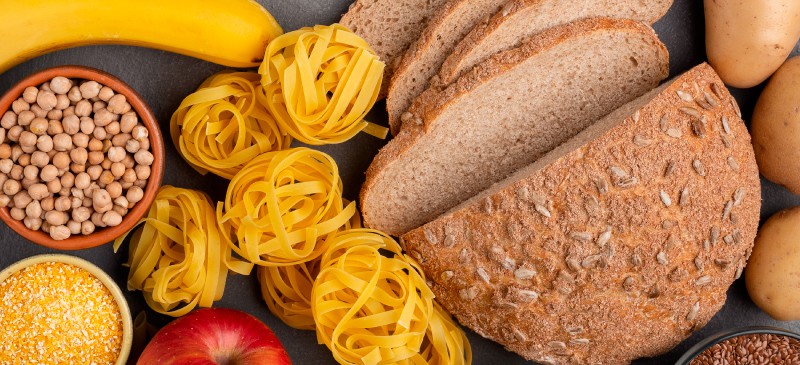
Depending on whom you ask, carbohydrates can be described in very different ways. For some, they are an essential part of a well-rounded diet. For others, they’re considered detrimental for nearly every aspect of health, from your waistline to your heart.
The truth is that carbohydrates are an important part of the diet and found in a variety of healthy foods, including fruits, veggies and whole grains. Understanding the different types of carbs — such as good carbs vs. bad carbs — and picking the right ingredients can ensure that you take advantage of all the health benefits that this macronutrient has to offer.
What is a carbohydrate? What foods are carbohydrates?
Why are carbohydrates important? What are some examples of carbohydrates?
Let’s take a closer look at this important nutrient and how it can impact your health.
What Are Carbohydrates?
According to Oxford Dictionary, the official definition of carbohydrates is: “Any of a large group of organic compounds occurring in foods and living tissues and including sugars, starch, and cellulose.” To put simply, carbohydrates are one of three macronutrients found in foods, right alongside proteins and fats.
Carbon, hydrogen and oxygen are the building blocks of carbohydrates, which combine to form simple sugars like glucose, fructose and galactose. These small molecules, also known as monosaccharides, come together to form larger, more complex compounds called disaccharides or polysaccharides.
Carbohydrates are found throughout the food supply but are present in higher concentrations in certain ingredients. Fruits, starches, legumes and dairy products are a few examples of common foods with carbohydrates.
Nutrition
Decades of research show that carbohydrates are an important part of a nutritional diet. Unprocessed complex carb foods are an essential part of a healthy diet. They are rich in vitamins and minerals, help us feel full and provide fuel for the body.
There are three common examples of carbohydrates:
- sugars
- starches
- fibers
Sugars are made up of monosaccharides, including glucose, fructose and galactose. Besides table sugar, other sweeteners like honey, maple syrup, agave nectar and molasses all fall into this category.
Meanwhile, starches are made up of longer chains of polysaccharides. Some common carbohydrates examples of starches include grains like wheat, oats and quinoa, along with vegetables such as potatoes, peas and corn.
Finally, dietary fiber is a type of carbohydrate that is not digested in the body. These healthy carbohydrates pass through the gastrointestinal tract, adding bulk to the stool to promote regularity.
Dietary fiber is found in several foods, including fruits, vegetables, whole grains, legumes, beans, nuts and seeds.
Function
Wondering what carbs actually do in the body and what happens if you don’t get enough carbohydrates? Carbohydrates function as a source of energy for the cells.
When you eat carbohydrate foods, the carbs are broken down into smaller compounds, such as glucose, to provide fuel for the cells in your body. Excess carbohydrates are stored in the form of glycogen in the liver and muscle.
What happens if you eat a no-carb diet? When your body doesn’t get enough carbohydrates from food, it turns to these glycogen stores as a source of fuel for the body.
Certain types of carbohydrates also play a key role in digestion, heart health and brain function. In some cases, the body is able to convert other nutrients — such as protein or fat — into glucose to fulfill specific functions.
In other cases, a lack of certain types, like fiber, can take a toll on everything from cholesterol levels to bowel function and beyond.
There are a number of different ways to categorize, classify and define carbohydrates. At a molecular level, the main types are broken down by the carbohydrate structure.
Monosaccharides are the simplest form. They are made up simple sugars that cannot be broken down or further hydrolyzed.
Meanwhile, disaccharides are molecules with two sugar molecules, and polysaccharides are composed of long chains of individual sugar molecules.
The different carbohydrates sources can also be grouped into unique categories. Starches, sugars and fiber are the main carbohydrates types.
Starches include foods like quinoa, wheat, corn, peas and potatoes, while sugar, as its name implies, encompasses simple sugars like sucrose, maltose and lactose.
Meanwhile, dietary fiber is a group of carbs that moves through the body undigested. This includes fruits, vegetables, beans, legumes, nuts and seeds.
Simple vs. Complex Carbohydrates
The terms simple carbohydrates and complex carbohydrates refer to the structure of carbohydrates. Simple carbs are composed of monosaccharides, or simple sugars like glucose, which can be found in white bread, pastas and baked goods.
Complex carbs, also sometimes called “good carbohydrates,” are made up of long chains of polysaccharides.
The carbs in quinoa or the carbs in beans and veggies are a few examples of complex carbohydrates. Other complex carbohydrates foods include peas, brown rice, chickpeas and oats.
Related: Oligosaccharides: The Prebiotics that Support the Heart & Gut
Benefits (Why We Need Them)
1. Promote Heart Health
Carbohydrates can help support heart health and reduce the risk of cardiovascular disease. Soluble fiber, in particular, has been shown to decrease levels of total and “bad” LDL cholesterol, both of which are major risk factors for cardiovascular events.
READ RELATED: Hayley Squires Height, Weight, Age, Body Statistics
What’s more, one study published in BMJ also found that eating more whole grains was associated with a lower risk of heart disease.
2. Aid Weight Loss
Although carbohydrates have a reputation for being unhealthy and fattening, certain types may actually aid in weight loss to help manage your waistline. High-fiber, healthy carbs like fruits, veggies, whole grains and legumes are especially beneficial when it comes to weight loss.
Fiber moves slowly through the digestive tract, helping keep you feeling fuller for longer to cut down on cravings between meals. One study in the Journal of Nutrition followed 252 women over a 20-month period and found that eating more fiber was associated with a reduced risk of weight and fat gains over time.
3. Boost Mood
Some research suggests that cutting carbs too much could have a negative effect on mental health and mood. In one study out of South Australia, people who followed a low-carb diet for a year experienced mood disturbances, including increases in depression, anger, hostility and anxiety.
4. Provide Energy
The primary function of carbohydrates is as a source of energy for the cells. Complex carbs are broken down into simple sugars in the body, which are taken into the cells and used as fuel.
Glucose, or sugar, also acts as the primary form of energy in the brain to promote healthy cognitive function.
<span data-mce-type=”bookmark” style=”display: inline-block; width: 0px; overflow: hidden; line-height: 0;” class=”mce_SELRES_start”></span>
Risks and Side Effects
Keep in mind that not all carbohydrates are created equally. Despite the benefits associated with complex carbs and fiber, refined carbohydrates are typically lacking in many important nutrients and have been tied to a higher risk of inflammation and insulin resistance. There’s also research indicating that refined carbohydrate consumption can cause elevated high blood sugar and increased triglyceride levels.
Consuming excess amounts of added sugar can also cause a slew of negative side effects. Sugar-sweetened beverages, for example, have been linked to a higher risk of obesity, type 2 diabetes and metabolic syndrome, which is a cluster of conditions that can increase the risk of heart disease, diabetes and stroke.
Therefore, it’s essential to choose high-fiber, nutrient-dense carbs whenever possible. This can help maximize the quality of your diet and prevent potential negative side effects associated with refined carbohydrates.
Carbohydrates play an important role in the body. However, not all foods high in carbohydrates are created equal.
In fact, picking healthy, high-fiber sources of carbohydrates is absolutely essential to maximizing any potential health benefits.
Steer clear of added sugars and refined carbs, such as white pasta, baked goods, potato chips and pretzels. Instead, opt for nutrient-rich carbs, such as whole grains, legumes, fruits and veggies.
Not only can these foods help reduce the risk of negative side effects associated with refined carbs, but they can also supply the important vitamins and minerals that your body needs as well.
Good Carbs vs. Bad Carbs
What are bad carbs to eat? Do the carbs in milk, carbs in rice and carbs in honey have different effects on health?
Carbs are often categorized as “good” or “bad.” The carbs in oatmeal or the carbs in an apple, for example, are considered “good carbs” because they contain complex carbs and fiber to minimize the effects on blood sugar.
Conversely, the carbs in sweets, sodas and sports drinks are classified as “bad carbs” because they are quickly digested, leading to spikes and crashes in blood sugar levels.
Related: Are Bagels Healthy? Bagel Calories, Nutrition, Benefits & Downsides
Carbohydrates and the Glycemic Index
The glycemic index is a tool used to measure how much specific foods increase blood sugar levels. Sugar-rich, high-carb foods tend to have a higher glycemic index, meaning they increase blood sugar levels quickly.
On the other hand, complex carbs that are high in fiber tend to have a lower glycemic index, which means that they won’t cause spikes in blood sugar.
Daily Intake
How many grams of carbs per day do you actually need?
The recommended dietary allowance (RDA) can depend on a number of different factors.
According to the most recent Dietary Guidelines for Americans, the RDA for carbohydrates is about 45 percent to 65 percent of total daily calories.
For reference, each gram of carbohydrate contains about four calories. This means that if you eat 2,000 calories per day, 900–1,300 should come from carbohydrates, which equals about 225–325 grams.
Low-carb diets, such as keto, can be beneficial in many cases as well. Studies show that low-carb diets can enhance weight loss, improve cholesterol levels and promote blood sugar control. A low-carb diet may involve cutting carb intake to around 50–100 grams per day, while keto diets reduce net carb consumption to just 20–30 grams per day.
For those with diabetes, following a moderate low-carb diet has been shown to help manage blood sugar levels, which typically involves limiting carb intake to 20 percent to 35 percent of total daily calories. However, how many carbs per day you need can range, so it’s best to talk to your doctor or dietitian before making any dietary changes if you have diabetes.
Wondering what foods have no carbs, which vegetables have no carbs or what fruit is lowest in carbs? There are plenty of carb calculator tools out there, plus many different low-carb recipe ideas and tips available as well.
As a general rule of thumb, try to stick to foods on the complex carbs list to ensure you get enough fiber while keeping carb intake in check.
Related: What Is A Carb Cycling Diet? How It Can Boost Weight Loss Efforts
Conclusion
- What are carbs? What are carbohydrates made of? According to the carbohydrates definition, carbs are one of three macronutrients found in food that are composed of carbon, hydrogen and oxygen molecules.
- There are several different options for carbohydrates classification, but they can be broken down into three main categories. What are the three types of carbohydrates? In general, carbohydrates can be categorized as either sugars, starches or fiber.
- What do carbohydrates do? There are numerous functions of carbohydrates, but they act primarily as a source of energy for the cells. Certain types also play a role in digestion, heart health and brain function.
- Benefits of healthy carbohydrates include enhanced heart health, increased weight loss, better mood and increased energy.
- However, certain types of carbs can affect the body differently. Despite the benefits associated with healthy foods on the complex carbohydrates list, foods high in carbs and added sugars can actually have negative effects on health and may even contribute to chronic disease.
- Be sure to stick to healthy options on the list of carbohydrates, such as fruits, veggies, whole grains, legumes, nuts and seeds.
Source:









